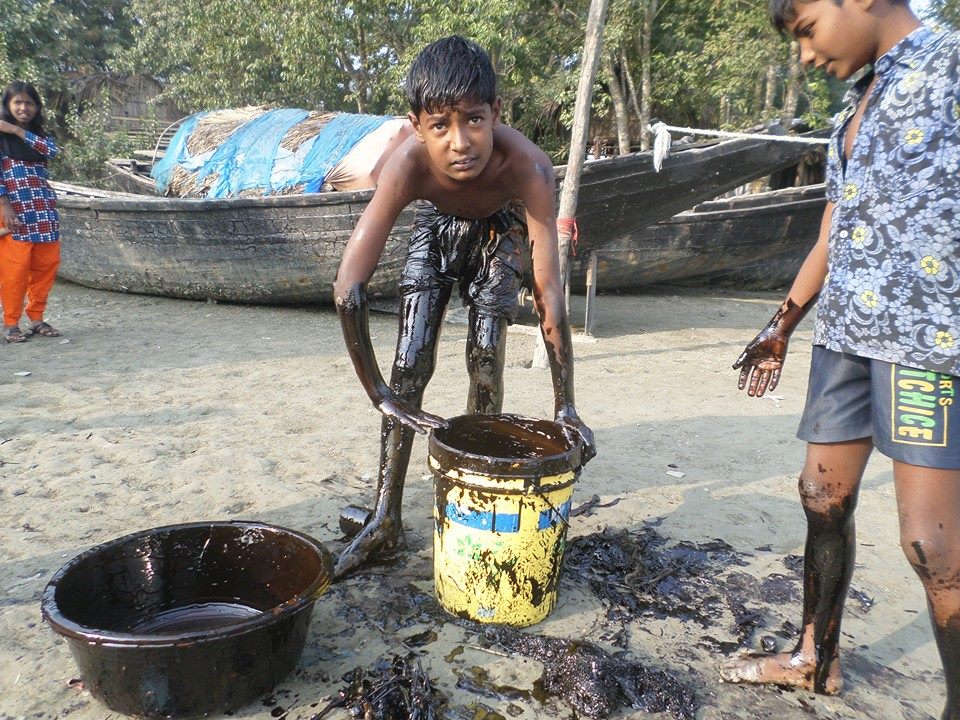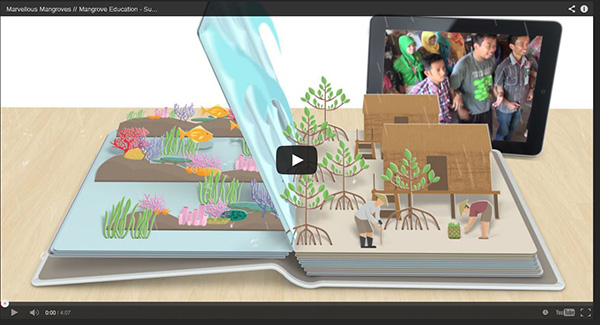MAP News Issue 356 – January 24, 2015
The MAP News | |
FEATURE STORY Honey hit in Coringa mangroves  INDIA – The indiscriminate use of pesticide in its adjacent farmlands has taken a toll on the honey production in the Coringa mangroves. Coringa, located near to Kakinada, is considered to be the second largest mangrove in India after the Sundarbans in West Bengal. Bhitarkanika in Odisha is in third place when it comes to the size. Spread in an extent of 333 square kilometres, the Coringa mangrove has been the home for a wide range of flora and fauna. The honey production in Coringa is much lesser when compared to that of the Sundarbans and the Bhitarkanika. Moreover, the production has been on the decline year after year, which has prompted the MS Swaminathan Research Foundation to work on the casuarina plantation in Coringa to improve its density. “Unlike Sundarbans and Bhitarkanika, agriculture fields are located very close to the Coringa. As the honey bees are known for their relentless travel, they happen to get affected by the pesticides being used by the farmers. As a result, there has been a visible drop in the honey production,” R. Ramasubramaniyan, senior scientist from the foundation told The Hindu . READ MORE AFRICA Shell Will Pay Over $84 Million to Nigerians Whose Community it Destroyed  NIGERIA -Royal Dutch Shell has finally agreed to an $84 million settlement with residents of the Bodo community in the Niger Delta for two oil spills that occurred six years ago. Lawyers for 15,600 Nigerian fishermen say their clients will receive $3,300 each for losses caused by the spills. The remaining $30 million will be left for the community, which law firm Leigh Day says was “devastated by the two massive oil spills in 2008 and 2009.” Interestingly, the settlement avoids Shell having to defend a potentially embarrassing London high court case, which had been scheduled to start shortly. These were among the biggest spills in decades of oil exploration in Nigeria, and thousands of hectares of mangrove were affected in the southern Ogoniland region. READ MORE ASIA Sundarbans Oil Spill: An Urgent Wake Up Call for the Bangladeshi Government  BANGLADESH – Another day, another calamity wrought by the fossil fuels industry. The latest? Over 75,000 gallons of oil spilled out of a downed tanker and into the Sundarban Delta straddling Bangladesh and India. A UNESCO-protected world heritage site, the Sundarbans are the world's largest tidal mangrove forest, and, as home to hundreds of endangered Bengal tigers and riverine Irrawaddy and Ganges dolphins, it is one of the most bio-diverse places on Earth. Transporting tens of thousands of gallons of oil through one of the most fragile and magnificent ecosystems on Earth — what could go wrong? It seems that no one at the Padma Oil Company bothered to ask. In the absence of any concerted government clean-up effort, the post-atrocity game plan, so far, has desperate, unprotected, and ill-equipped villagers sponging, spooning, and netting oil out of the water. READ MORE Editor’s Note ‑ This is a rather disturbing news post in that our efforts to reduce shrimp consumption in the EU and Europe may be offset by China's increasing appetite for the world's shrimp. This can lead to a shortage of shrimp destined for the EU and N. America, thus catalyzing an expansion of shrimp production to feed both China and the other shrimp importing nations. And the indebtedness of so many nations to China's loans is also giving China big economic bargaining power! Ecuador shrimp firms road show in Beijing ECUADOR – Ecuadorian seafood companies were in China last week courting new buyers in a new push for the China market, which could squeeze western buyers out of Ecuadorian supply lines. A trade fair in a Beijing hotel on 7 January facilitated one-on-one meetings between 30 Ecuadoran companies and Chinese counterparts, according to the Ecuador embassy in Beijing and the China Aquatic Products Processing & Marketing Association (CAPPMA), a trade body. The companies were selling refrigerated fish and prawns as well as tuna and fish oil and fishmeal, according to an introduction to the conference provided in Mandarin to Chinese buyers. With exports of shrimp to China up by a massive 104 percent year-on-year in the first four months of 2014 (according to data from Ecuador’s trade office in China) the companies travelled to Beijing in a trade delegation with Ecuador President Rafael Correa — a visit with an added urgency given the country’s export revenues are suffering from falling prices for oil, a key export. READ MORE Belitung boosts tourism with mangroves INDONESIA – The Forestry Office of Bangka Belitung Province is developing 500 hectares of mangrove forests on Belitung Island to conserve the areas and boost ecotourism. “This year, we are developing the mangrove forest areas in Selat Nasik, Pengantungan, and Tanjung Pandan,” Nazarliyus, the head of the forestry office, said in Pangkalpinang recently. He said the mangrove forests on Belitung Island are still not affected by offshore lead mining and encroachment activities. “We are managing the mangrove forests and building the facilities, so that visitors can enjoy the beauty of the island,” Nazarliyus said as quoted by Antara news agency. According to him, the mangrove forest areas in Belitung are still well-conserved, as the administration has formulated policies to protect its biodiversity potential. READ MORE Fishermen Power Regenerates Mangroves INDIA – With gale wind and tidal inundation threatening their very existence, fishermen communities on the shoreline of Chilika lagoon have taken to regenerating mangrove plantations which faced a wipe-out in the last decade and a half. So far, over 40 hectare of mangrove in Puri’s Arakhakuda village, lying between the Bay of Bengal and the brackish water lagoon, have been re-introduced. While mangroves act as a bio-shield from natural calamities, Phailin was almost devastated last of the coastal plantations two years back, leaving the shoreline habitations exposed to nature’s vagaries. Under Integrated Coastal Zone Management Project (ICZMP), the Government made a move to persuade villagers, mostly fisherfolks, to go for mangrove regeneration. The villagers played an active role in identification of the sites where the plantations were taken up. Importantly, locations outside forest areas were chosen for the exercise. READ MORE Fencing to protect mangroves from garbage INDIA – The mangrove cell has stepped in to save mangroves of Lokhandwala-Oshiwara area after it was found that the garbage from the dumping of waste in an area owned by the civic body appeared to be spilling over into the surrounding mangroves. The cell has asked the civic ward to construct fencing around their operational area and clean the mangroves at the earliest. The Brihanmumbai Municipal Corporation (BMC) operates a two-acre ‘refuse transfer station’ area near the Versova lagoon surrounded by mangroves. At a refuse transfer station, garbage from nearby areas are brought in by smaller garbage vehicles and get transferred to the bigger vehicles that take the garbage to the dumping grounds. Following complaints, members of the mangrove cell visited the area and observed that garbage from the area went into the mangroves due to wind, affecting the mangroves. READ MORE MAP’s Marvellous Mangroves in Bangladesh  BANGLADESH – Culminating one of the busiest years ever, MAP’s Marvellous Mangroves curriculum straddled the year break and began 2105 in the amazing Sundarbans forest of Bangladesh. A quick recap of 2014 shows Education Director Martin Keeley visiting Kenya early on where initial work has started on translating into Swahili and adapting Marvellous Mangroves for schools in that country. Later in January he visited Freeport, Bahamas, where students and teachers enjoyed a two-‐day workshop. The summer started with a joint workshop held in South Sulawesi, Indonesia, with co-sponsors Blue Forests. Founder Ben Brown organised the translation and adaptation of Marvellous Mangroves for use in Indonesia, and it was launched at a 3-day teachers’ workshop at PPLH Puntondo, Takala, South Sulawesi with 30 teachers attending as well as a surprise afternoon visit from 15 schoolchildren (grades 5‑7). READ MORE AMERICAS Editor’s note – this email was received along with the link to the article “Charting the plastic waters” above. Hi Alfredo, Not yet a subscriber? Click here to subscribe. Please cut and paste these news alerts/ action alerts on to your own lists and contacts. Help us spread the word and further generate letters of concern, as this can make a big difference in helping to halt a wrongdoing or encourage correct action.
| Action Alerts: WORLD WETLANDS DAY The Mekong River means life: stop the Don Sahong Dam SIGN THE PETITION The importance of mangroves to people: A call to action CLICK HERE |
Mangrove Action ProjectClick here to view past newsletters | |









